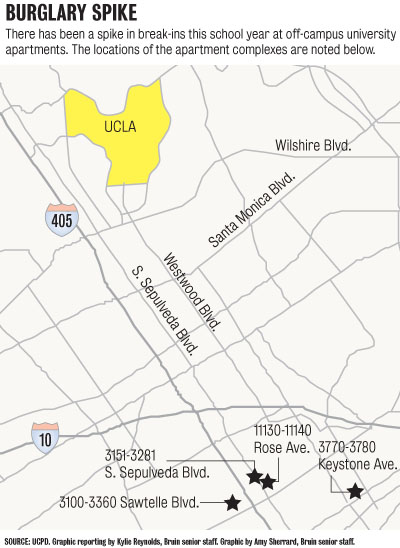Three off-campus university apartment complexes have experienced a spike in break-ins this school year, according to university police.
There have been more than 20 burglaries and attempted burglaries since September at university apartments on Sepulveda and Sawtelle boulevards and Rose and Keystone avenues, in a set of graduate student apartment complexes called University Apartments South, according to a recent report released by the UCPD.
This is compared to 11 burglaries and one attempted burglary at the University Apartments South complexes from January 2010 to September 2011, said UCPD spokeswoman Nancy Greenstein.
Alexandra Shilling’s university apartment was broken into on Feb. 29. When Shilling and her husband came home that night, they saw trash dumped next to their exercise machine. The trash bag was missing, she said.
But when they searched the apartment, she and her husband found that nothing had been stolen, said Shilling, a world arts and cultures graduate student.
On closer inspection, Shilling found that the door had been pried open.
A trend in break-ins using the same prying technique has been on the rise in Southern California, but police are not sure of the cause of the upswing, said UCPD detective Andrew Ikeda. It has been the primary technique used in the university apartment break-ins this year, he said.
Mostly laptops, small electronics and other items that are easily concealable have been stolen from the apartments, Ikeda said.
After some burglaries, like the one in Shilling’s apartment, however, nothing was taken. Often in these cases, the available goods were difficult to conceal, like flat-screen TVs.
But in some apartments, there were laptops left behind, Ikeda said.
“It’s a bit of a mystery,” he said.
UCPD does not know if the same person or a group of people are breaking in to University Apartments South, Ikeda said. Currently, UCPD has not named any suspects in relation to the burglaries, he said.
Shilling said she is concerned because she does not feel UCPD and apartment management are adequately addressing the burglaries.
The current means of security at the apartments are UCPD patrols and apartment gates, which need a key card to enter, said Shirley Wong, the director of the University Apartments.
The gate to the maintenance building remain open until 4:30 p.m., she added.
Matt Stewart, a graduate student at the UCLA Anderson School of Management who recently moved to University Village, said the break-ins make him nervous.
“I have a daughter who turned 1 years old (Thursday),” Stewart said. “I chose University Village because I thought it would be safe.”
While he knew that Los Angeles had a potential for crime, he still has some concerns about University Village security, he said. Stewart said he has noticed some motion sensors and video cameras that look relatively new, but added that he’s never seen a uniformed police officer walking through University Village.
Ikeda said UCPD has increased and varied its patrols in the area, although the extent of the increase is not being released because it is an ongoing investigation. Patrolling at random times is an effective patrolling strategy, he added.
The key to stopping the burglaries is improving strategies on getting the word out about the incidents, said Asiroh Cham, a graduate student in Asian American studies and the president of the University Apartments South Residents Association. While management sends out information on a listserv, it is hard to gauge how many people are getting the information, she added.
University Apartment South management has sent out letters and diagrams about the importance of deadbolting, Cham said. The deadbolt can be put into place from outside the door by inserting a key card, punching in the four-digit code and pulling the handle up instead of down. The deadbolt provides another barrier against prying open a door.
This has been somewhat effective ““ the implementation of the deadbolt prevented four recent attempted break-ins, Ikeda said.
During the break-in at Shilling’s apartment, the deadbolt was not in place.
Shilling received many emails and regular mail detailing the need to use her deadbolt, but would still like more direct information from UCPD, she said.
UCPD recently gave an educational seminar on how to deadbolt university apartment doors, Ikeda said. He added that while deadbolts do not necessary prevent break-ins, they do act as a deterrent in most cases.
Residents should also lock their garages, Ikeda said. Open garages can make residents seem like easy targets to people planning break-ins, he said.
Some residents have expressed an interest in installing security cameras, which currently are only at the Sepulveda Boulevard facilities entrance, Cham said. While management is looking into different methods to insure the safety of residents, they could not provide more specifics because they did not want to reveal possible security strategies, Wong said.
Graduate students have also been trying to start a neighborhood watch, but it hasn’t been able to start because of the difficulty in coordinating the schedule of full-time students with the watch, Cham said.
Ikeda said university apartment residents should call police immediately if they see any anything suspicious or anyone loitering outside of the building.
Anyone with information regarding these burglaries should contact UCPD at (310) 825-1491.
